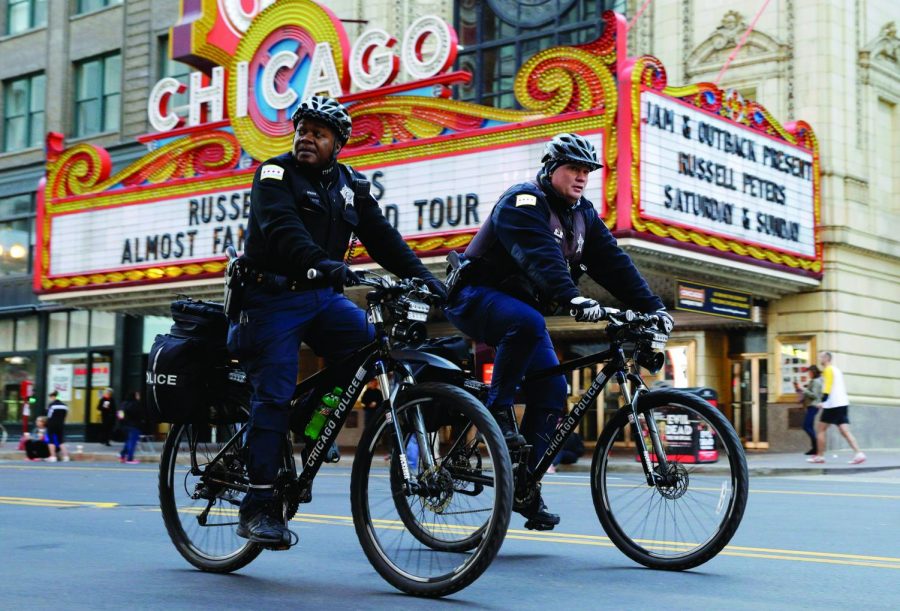Mayor to invest millions more on bicycle police
Mayor to invest millions more on bicycle police
October 27, 2014
In the 2015 city budget, Mayor Rahm Emanuel allotted $2 million to expand and train Chicago Police Department officers that patrol the city on bikes. According to the 2015 budget overview, Emanuel said police officers on bikes in high-crime areas help fight crime and make police officers more approachable.
Jeffrey Baker, a candidate for alderman for the 21st Ward and president of the Committee for a Better Chicago, a grassroots networking organization that connects organizations and resources, said more police officers on bicycles will be better for communities, but he is unsure if they will reduce crime.
“I don’t think the police alone are going to be able to cure crime, but it will be a deterrent because you’re going to improve the relationship between the community and the police,” Baker said.
Baker, a resident of Auburn Gresham, a neighborhood that has a lower crime rate than nearby Englewood, Grand Crossing and Roseland, said having more police officers on bike patrol in his community will resonate with residents who have always asked for police officers to patrol the neighborhood on foot rather than have them patrol in cars.
“I’ve been involved in community organizing for over 15 years, and bringing the police closer to the community has always been a want of the community,” Baker said. “This has been something that the people have wanted longer than I can remember.”
However, Tristan Sims, a 20- year-old Englewood resident, peer advocate employee at the University of Chicago and senior journalism major, said having more police officers on bikes is not necessary. He said spending money to increase bike patrol in his neighborhood is pointless because he only sees police officers on bikes at night and barely sees them during the day.
“I think the mayor’s budget could be spent on something that is more productive,” Sims said. “How about paying off the debt or even using it to benefit public schools, colleges and universities?”
Sims said there are assaults, robberies and other illegal activities that take place during the day when people are working, which is when police officers should be heavily patrolling the neighborhoods.
“I haven’t seen that many bike cops, and when I do see them, [it’s] at night,” Sims said. “So unless bikes cops are going to help at night, then I don’t think it’s going to be productive when they can be more beneficial during the day.”
David Johnson, an 18-year-old, Roseland resident said he does not understand why police officers would be on bikes in South Side neighborhoods. Instead, bike officers should be downtown because there are barely any bike lanes on the South Side and believes police officers on the South Side would be more protected in cars, he said.
“I don’t see what more bicycles will do,” Johnson said. “Living in my area, I feel like cars would be better. It’s [more] efficient [and] it gets you places quicker. Also, you don’t see bike lanes a lot and [in Roseland] police are already on edge and they’re only in cars. Imagine if you’re up close and personal on a bike—that’s going to make everything worse.”
Johnson also said Roseland residents generally distrust police officers. He thinks that they would feel more vulnerable and unsafe on bicycles. He said police officers on bikes are perceived as not being productive and Emanuel could spend the money on things needed for the city.
“When you think of bicycle cops, you don’t really think [they’re doing] their jobs even though they are bicycle cops that go through certain things that every [other] cop does,” Johnson said. “I feel like money could be put into different things other than more bicycle police.”
Darryl Smith, president of the Englewood Political Taskforce, said the mayor should meet with residents, church figures and community organizers to figure out how to spend the tax-payers money. He also said the money should be spent on a holistic approach to curbing violence.
“At the rate that crime is rising, bicycle police will not be of any help to the violence that’s going on,” Smith said. “He needs to put more police on foot patrol, and not just on the main streets, but on some of the smaller streets where a lot of the activity is going on. To spend $2 million on bikes, to put extra police on bikes, that’s ludicrous. It’s a waste of time and it’s a waste of taxpayers’ money.”








